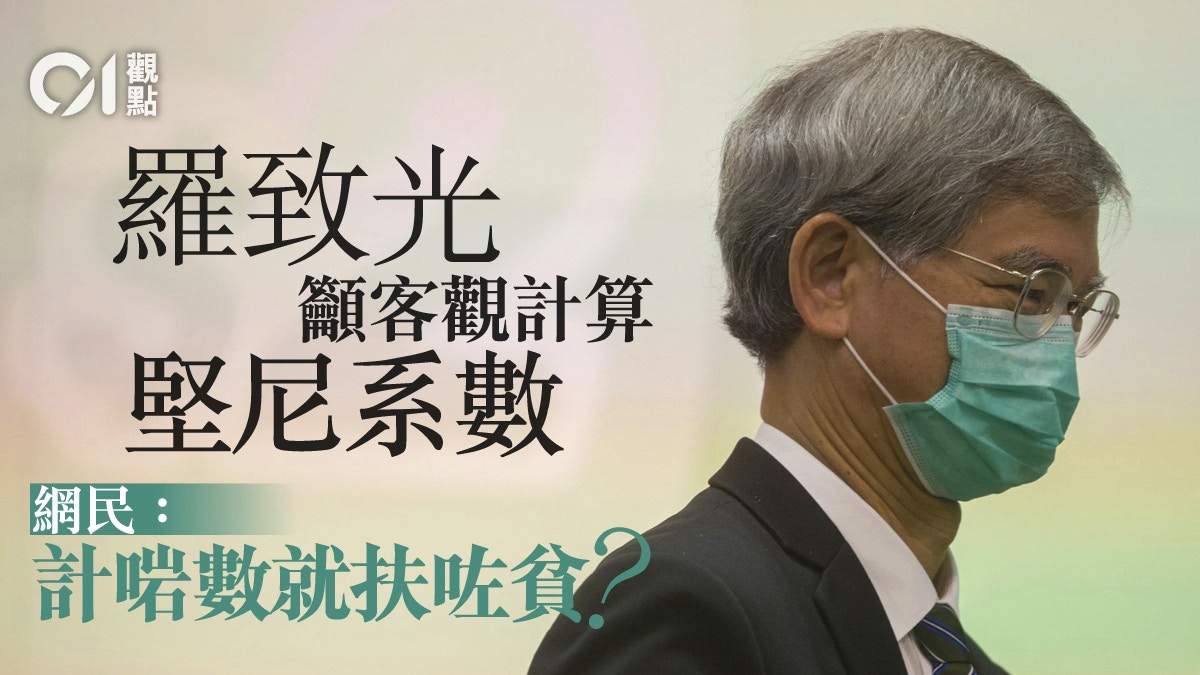The Secretary for Labour and Welfare Law Chi-kwong reiterated the issue of the disparity between the rich and the poor in Hong Kong in a new blog on Sunday (August 8), criticizing "General scholars, media and current affairs commentators are still accustomed to using Hong Kong’s pre-tax and pre-benefits "Coefficient" is not fair. It also refers to the Hong Kong Gini coefficient calculated based on household income after taxation and welfare transfers are used in the "World Competitiveness Annual Report" published by the Lausanne Institute of International Management in Switzerland earlier.
According to the interpretation of the Census and Statistics Department, household income after tax refers to the deduction of salaries tax, property tax, rates and land rent paid by its members, while the transfer of benefits includes in-kind benefits such as education, housing and medical benefits.
According to the 2016 Population By-census, the average monthly household income in Hong Kong after tax is about 7.2% lower than the original total, and after tax and welfare transfer is about 4.3% higher than the original total.
Luo Zhiguang.
(Photo by Luo Junhao)
Local income inequality continues to worsen
No matter what calculation method is adopted, it is still an indisputable fact that the disparity between the rich and the poor in Hong Kong has continued to deteriorate since the reunification.
In 1996, Hong Kong’s Gini coefficients were compiled based on the original income, after taxation, taxation and welfare transfer income, respectively, were 0.518, 0.508, and 0.466. The corresponding figures in 2016 were 0.539, 0.524, and 0.473. The increase was recorded, showing that the level of income inequality among citizens has been expanding.
In addition, Luo Zhiguang also mentioned in his blog that it is "reasonable" to compare the income inequality of Hong Kong with other international cities and financial centers, and cited the Gini of New York City in 2015 based on the original income. The coefficient is higher than Hong Kong's 0.551, but he didn't seem to notice that this number has fallen in the following years. It first fell to 0.5504 in 2017 and then fell to 0.547 in 2019. The gap with Hong Kong is also getting narrower.
Remedy helpless structural problems afterwards
Moreover, all kinds of welfare transfers are essentially post-remedial measures taken by the government, so the original household income inequality before tax and welfare transfers tends to show the structural defects of the entire society.
When the general opinion believes that the Gini coefficient is higher than 0.4, it is considered high, but Hong Kong has actually failed to get rid of this situation after investing in government welfare. This only shows that our disparity between the rich and the poor is really serious, and we must try to eliminate the problem fundamentally.
The disparity between the rich and the poor is becoming more serious, and the potential class contradictions in Hong Kong are like a gunpowder storehouse.
(Photo by Zhong Weide)
In fact, in the past few years, Luo Zhiguang has written more than once to call attention to the calculation method of the Gini coefficient. In September 2018, he pointed out that only the pre-tax Gini coefficient was a "fundamental analysis error." I also compared the Gini coefficient between Hong Kong and France before and after tax and welfare transfer.
However, this time he still has to admit that the latest rankings in the World Competitiveness Annual Report reflect that "Hong Kong's disparity between the rich and the poor is still among the highest one-third of the 64 economic systems."
Obviously, President Xi Jinping only announced the completion of a moderately prosperous society in mainland China last month. The mainland policy continues to emphasize that "common prosperity" should focus on enhancing the sense of gain and happiness of the frontline people, not just looking at the overall figures.
So why are the officials in charge of labor policies in Hong Kong still "popularizing science" with different calculation methods for the Gini coefficient at this moment?
He should have more important work to do than to tell the numbers.
Ten major reforms.
V. Reform is the ten-year theme of Hong Kong society. Resolving the disparity between the rich and the poor is the best way to encourage childbirth. What senior officials have learned from the Centennial Party Celebration?





/cloudfront-eu-central-1.images.arcpublishing.com/prisa/AYBDQARVBB2WDG6IFPXHYFIMBM.jpg)









